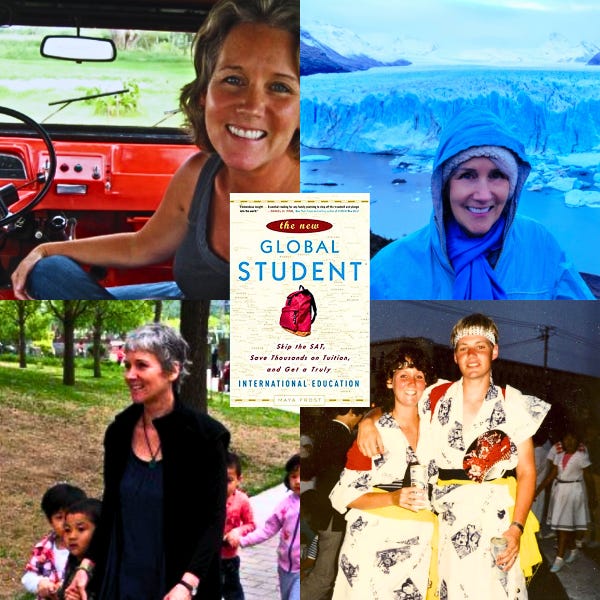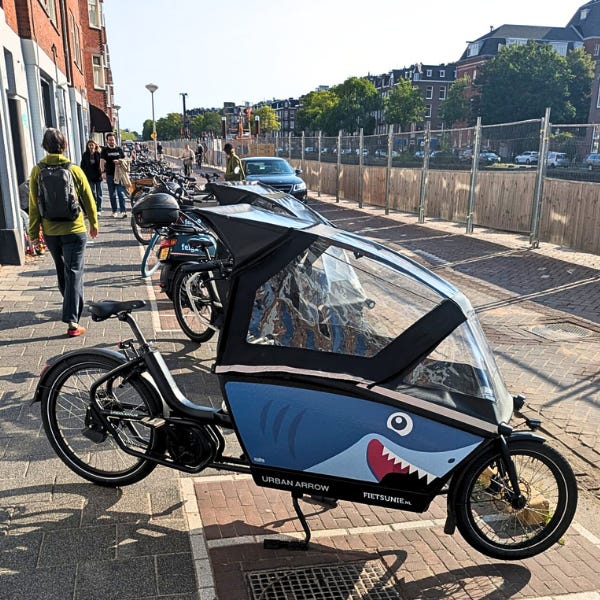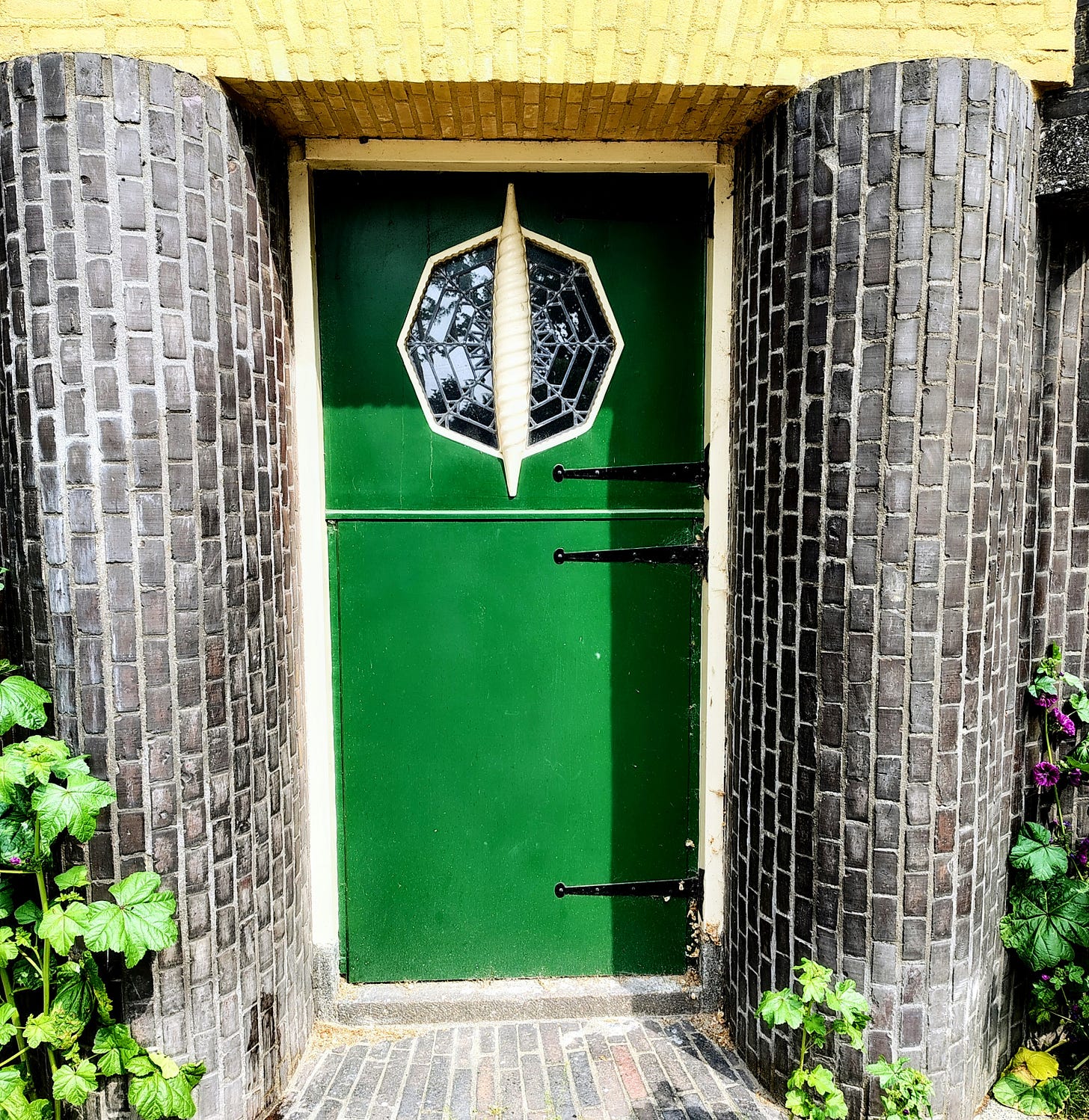"Should I Stay Or Should I Go?"
Whether you've always dreamed of living abroad or find yourself considering it now for the first time ever, here's what you need to know before you go.
NOTE: today’s post is longer than usual. I wanted to include critical information for anyone considering moving abroad right now.
If you're a U.S. citizen now living in the States and contemplating a move abroad due to a shift in [gestures wildly] everything, you're not alone.
There is a surge of interest in making a big move...or at least, making a Plan B.
And I get it. I left the U.S. back in 2005. Not because of politics (though remember how bad we thought George W. Bush was? 🤣) but because my husband and I wanted to spend time abroad with our family, and we had a hunch it would shift the futures of our four teenage daughters.
It definitely did. Three of our four daughters live outside of the U.S.
And it shifted ours, too.
Oh, we made TONS of mistakes along the way.
And we learned from every single one of them.
People kept asking us how our daughters were able to graduate from U.S. or Canadian universities at 19 or 20 with no debt, and without the typical SAT/ACT/IB/AP path to college.
I wrote a query letter, and got a book deal.
My book, THE NEW GLOBAL STUDENT - published by Crown (Random House) in 2009 - became the how-to handbook for students and families interested in exchange programs, studying abroad, worldschooling, or just skipping the harrowing college-prep path, saving thousands of dollars on tuition, and getting a truly international education.
The book was mentioned in the revised edition of The 4-Hour Workweek by Tim Ferriss, read by every digital nomad.
I spent the next few years helping students and families do high school and college differently and/or spend time abroad, together or apart. Fun fact: I had a whole chapter about going to college for practically FREE in Europe, with programs in English, but my publisher did not want me to encourage families to educate their college-age students outside of the U.S. Also: I had to take out the part where I predicted that college costs would triple within 20 years - too alarmist, but also accurate. So, I was happy to have a chance to help families directly in finding these great options that didn’t saddle their kids with debt.
Meanwhile, I continued to live different lives in different countries.
Clockwise from top right: Argentina, Japan, China, Uruguay.
Sixteen years is a long time in non-fiction book years. Things have changed a lot.
But THE NEW GLOBAL STUDENT came out during a recession, when many families were facing job losses and college tuition payments at the same time.
Plenty of folks are in that same position now. Plus, there are many more concerns about changes in the U.S. in general, from job stability to safety and healthcare, not to mention the overall outlook for the future.
All this to say that, back by popular demand, I am once again helping U.S. citizens decide whether they should stay or go. (I no longer deal with the education part.)
This time, though, I am speaking from a place of much deeper experience. I have been living outside the U.S. for the last 20 years, and a few weeks ago, I became a resident in my seventh country - The Netherlands.
Many of the U.S. citizens I have met abroad (not the ones I worked with) left their country and returned within a year, despite thinking they were going to start their dream life and stay forever. Many shipped containers of their belongings there and back, and even built new homes before deciding to return.
It was expensive and disruptive.
But also? Nearly every one of them would say they would do it all again in a heartbeat.
Still, when people ask me for advice, I am cautious. And I know the warning signs that go unheeded before departure.
Keep in mind that I only work with those who are going abroad WITHOUT corporate expat packages that provide work, housing, education, and support every step of the way.
I help the bold ones who are doing it all on their own, and in nearly every case, it’s their first move to a new country.
It takes courage, creativity, and planning.
It also takes patience, and a willingness to feel like an idiot on a regular basis.
I never tell anyone that moving abroad is the answer to their problems. Instead, I focus on helping them understand what they are longing for. Because if they don’t know what they want, how can they take the right next steps?
There is no more challenging creative adaptation experience than moving to a new country, with a new culture and language, new food, new holidays, new climate, etc. where no one knows you and you must start from scratch to build a new life.
It can be extremely humbling. And that’s part of the value of it.
Because, to be honest, most Americans could use a bit of humbling. But it can be brutal at times.
Exhibit A: nobody cares what you used to do. (Only in the U.S. do people ask within a minute of meeting you, “So, what do you do?”)
In many ways, you become a blank slate. That can be exciting! Or terrifying. Or devastating. Those who have held positions of authority can become especially flummoxed - and unbearable to be around. This isn’t good for anyone, including the unfortunate locals with whom they are trying to build a community.
But if you can embrace the blank-slate experience, it can be illuminating and profoundly liberating. It can be a wildly creative process of building new and intentional layers of who you want to be.
You don’t have to hold the same old opinions. You can start new positions or hobbies. You can choose to become more introspective or more social or a better dancer/painter/poker player/surfer than you’ve ever been in your life.
And this goes for every age, from five to 75 and onward.
(Thinking of our 80-something next-door neighbor who wrote five books after moving to Mexico at 75. She drove herself across the border on the day her son had planned to move her to an assisted living center.)
You are free to try new things, absorb all that is around you, and respond in new ways.
So, yes, leaving the U.S. might sound like an excellent plan and exciting adventure right now if you want to avoid whatever is going to happen in the next few months or years. And you might find a place you love and create a whole new life there.
But before you consider leaving, make sure you understand what you might miss. Pay attention to the things you love right now, right where you are.
And take the time to truly see the things you don’t fully appreciate.
Example: if you have a community or neighborhood you love, with deep friendships and support you can count on under any circumstances, that’s a pot of gold.
Because if things get more challenging - through storms and crises of all kinds - the most important advantage will be having those people around you. Those who know and trust you, who care for you and your family. Those with whom you have a history of reciprocity.
And that’s what you’ll miss when you leave. You might be taking it for granted, or even feel it’s annoying at times to have people know your business or offer their opinions. But that’s because they know you, for years or maybe even decades. Starting over somewhere else means you won’t have that - at least, not right away, and maybe not ever.
However, if you currently live in a situation in which you don’t have that support - no neighbors who could help you if you became ill or couldn’t get home and needed someone to feed your dog or watch your kids or water your plants - you have less to lose by moving abroad. And you might find your people there and build a community that lifts you up, and opportunities to enhance your life in wonderful ways.
So, to be clear, I am not advocating for a mass exodus.
There are all kinds of good reasons to stay in the U.S. - whether to fight for what’s right, be part of a community you love, continue your good work, live near your aging parents, etc. etc.
The last thing I want to do is nudge anyone to move abroad when it’s not the right time, place, or option for them.
Still, it’s fun and valuable to dream about having a new life in a new country. Imagining what that would look like is a valuable creative exercise. Notice the things that you see yourself enjoying in this dream life. Pay attention to what inspires you about it.
And maybe try bringing a bit of that into your current life first before researching visa options or buying your plane tickets.
When my husband and I left the U.S. with our daughters to move to Mexico, we sold everything (house, cars, furniture) except what fit into a 5-foot by 5-foot storage container.
We went from decision to departure in 30 days.
And that is certainly possible today. But it’s not the right option or time frame for everyone - or even a small percentage of people.
Part of the reason it was easier for my husband and me to extricate ourselves is that we were not fully embedded. Sure, we had work, kids in middle and high school, and aging parents. But we didn’t feel rooted, even though we were living within a few miles of where we had grown up. (We actually met in Japan, but that’s another story.)
We did not feel aligned with where we were.
We were okay with that for a while, and stuck it out for our kids, but we started to long for connection with those who would get us.
We had two big advantages:
We had lived abroad together before (in Japan) and were aware of the ups and downs.
We were on the same page! BOTH of us were excited about the move at the SAME TIME. This is critical…and unusual.
Because what I can tell you about the majority of those who end up returning is that one of the parties (we’re talking partners or family members here) was reluctant at first, unhappy upon arrival, and things went downhill fast from there.
I tell families considering a move abroad that it’s important to be realistic. You can’t expect everyone to be thrilled every day. We left when our girls were between 14 and 18. As my husband put it, “There’s going to be some crying no matter where we are.”
That being said, you have to be attuned to how things are going before, during, and after the move. Expect everyone to go through a period of worry or resistance. And a few tantrums are to be expected - adults included.
It tends to go one of three ways:
Everyone’s mostly on a high the first couple of months, and then someone crashes. (Often, it’s Dad, especially if the finances/work are not coming together as expected.)
Things are bumpy at first, but then everyone starts settling in, making friends, and building their new lives.
Someone is very unhappy from Day One, and despite the best efforts by all (unhappy person included), and giving it time (maybe even a full year), it just never gets good enough for them to agree to stay.
In those difficult cases, it might have been avoided if there had been more attention paid to anticipating all challenges before departure. (Guilty! 👋)
It’s hard to know how YOU are going to feel, let alone anyone else in your family. But by recognizing what EVERYONE is longing for, and how the move might enhance or decimate their possibility of getting that, you can make a smarter decision that won’t get derailed by despair later.
PROMPT:
Whether or not you’ve imagined yourself living in another country, I invite you to spend time thinking about what that might look like for you right now.
Where might you imagine yourself living?
What would you be happy to leave behind?
What would you miss? (Go deeper into this one: it’s not always what you expect it to be.)
What kind of life would you like to create for yourself (and others) if you started over in a new place?
And how would you feel if you learned that this new place and life you are imagining and getting excited about was NOT a viable option for you? (You're watching for relief here.)
Moments of Joy:
Since we’re all about gratitude and grabbing joy whenever possible despite our collapse awareness, here are a few things that made me smile during the last two weeks.
This passionflower vine growing in a tiny corner garden in Centraal.
This sharky Urban Arrow child carrier.
3. This pink hollyhock growing in a sidewalk crack.
4. This green door near Het Schip, the architecture museum showcasing the Amsterdam School of design that developed during the late 1800s and early 1900s. It focused on building beautifully-crafted and inspiring public housing for workers who had been relegated to crumbling tenements or filthy streets. These buildings are still in use all over Amsterdam, and quite lovely.
And finally, this notable pairing of boats on the canal on the way to our daughter’s place.
Thank you for being open to appreciating what you have where you are, and imagining what it might be like to leave and begin somewhere new to you.
I so appreciate you.
Maya xo
P.S. If you or someone you know is considering moving to another country from the U.S., I invite you to visit (or forward the link to) my Stay Or Go session with two weeks of text/voice support (because so many questions emerge once you start digging and reflecting after the session.)
▶️▶️▶️▶️ https://www.MayaFrost.com/stay-or-go













What a gift of knowledge to give someone thinking about living abroad. Certainly, a guide would be needed in this situation, especially if you are not a Corporate expat, with the help of your company to make things as smooth as possible for you (and pay most of the costs).
I worked in the HR department of a few large companies, where I saw a lot of expats 'behind-the-scenes' work. I can appreciate the amount of work it takes to help someone make this transition.
I always love the pictures you share of your world!
A great account of the realist considerations before making 'the jump', Maya.
I've made 'the jump' for a few series of 3 months to several Eastern European Countries.
I will never regret the adventure and it gives me confidence to stay abroad in future.
You're right - there are highs, lows and mistakes; problems do not just simply disappear.
As you suggest, if you can get on the right page at the right time with someone else that helps.